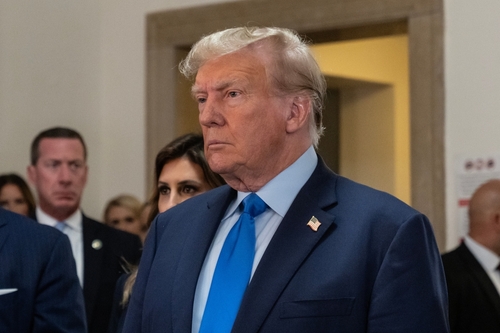Mexico’s newly democratic judicial selection process is about to put a convicted drug trafficker on the bench – because nothing says “justice” like a judge who’s already served prison time for smuggling meth across the border.
At a Glance
- Leopoldo Javier Chávez Vargas, a district judge candidate in Durango, Mexico, previously served nearly six years in U.S. prison for drug trafficking
- Chávez Vargas was caught smuggling methamphetamine hidden in a fire extinguisher at the Lincoln Juárez International Bridge
- His candidacy comes during Mexico’s first-ever popular election for judicial positions, raising serious concerns about organized crime infiltrating the judiciary
- The Mexican Senate plans to challenge his nomination before the Federal Electoral Tribunal
- His resume shows no work experience prior to 2020, suggesting a significant gap after his prison release
From Drug Runner to Judge: Mexico’s Judicial Crisis
Just when you thought our southern border crisis couldn’t get any more absurd, Mexico decides to one-up itself by potentially allowing a convicted drug smuggler to preside over criminal cases. Leopoldo Javier Chávez Vargas, currently campaigning for a district judge position in Durango, spent five years and seven months in U.S. federal prison after being caught with methamphetamine hidden in a fire extinguisher. Apparently, in Mexico’s brave new world of judicial reform, having firsthand experience with drug trafficking laws from the defendant’s side of the bench is now considered a qualification rather than a disqualification.
Chávez Vargas, whose resume conveniently has a black hole of employment history before 2020, claims he was completely oblivious to the meth stashed in the fire extinguisher he was transporting. Of course he was! And I’m sure the tooth fairy left it there while he wasn’t looking. The brazenness of this candidacy would be laughable if it weren’t so dangerous to Mexico’s already fragile justice system. He was charged with conspiracy to import methamphetamine, importation of methamphetamine, and possession with intent to distribute – a resume that should lead straight to disqualification, not judicial robes.
Mexico’s Dangerous Judicial Experiment
In what can only be described as a recipe for disaster, Mexico is holding its first-ever popular election for judges in 2025. While expanding democratic participation sounds nice in theory, in practice it’s opening the floodgates to candidates with deeply troubling backgrounds. Senate President Gerardo Fernández Noroña has raised the alarm about candidates with questionable histories, with Chávez Vargas being the poster child for everything that could go wrong with this system. The Senate is planning to challenge these nominations, but the fact that they made it this far is already a damning indictment of the vetting process.
“contribute to a judicial system that inspires confidence and combats impunity.” – Leopoldo Javier Chávez Vargas.
The irony of Chávez Vargas promising to “contribute to a judicial system that inspires confidence and combats impunity” is thick enough to cut with a knife. Nothing inspires confidence quite like a judge who’s already been on the wrong side of the law in a major way. This is the equivalent of appointing the fox to guard the henhouse, then being surprised when feathers start flying. But in Mexico’s current political climate, where organized crime routinely infiltrates government institutions, perhaps this candidacy is less an aberration and more a reflection of the country’s troubling reality.
The Cartel Connection
When we examine similar cases, a disturbing pattern emerges. Federico De Los Rios Rios recently pleaded guilty in a federal court in Del Rio, Texas, for attempting to smuggle fentanyl and cocaine from Durango, Mexico – the same region Chávez Vargas calls home – to Florida. Like Chávez Vargas, De Los Rios Rios claimed ignorance, saying he was just following instructions for a promised $10,000 payment. This raises serious questions: Is Durango a hotbed for drug trafficking operations? And if so, should someone with Chávez Vargas’s background be presiding over local justice?
“guarantee equal access to justice for all, with impartiality, legality, and commitment.” – Leopoldo Javier Chávez Vargas.
The connections between Mexican politics and drug trafficking run deep. A separate DEA investigation dubbed “Operation Polanco” revealed attempts to track how drug money potentially flowed into the 2006 presidential campaign of current Mexican President Andrés Manuel López Obrador (AMLO). The investigation centered on Mauricio Soto Caballero, a consultant with ties to both Mexican politics and drug trafficking organizations. While that investigation faced significant challenges and diplomatic hurdles, it highlights the entrenched nature of these criminal connections within Mexico’s political establishment.
The Border Crisis Connection
This judicial farce isn’t happening in isolation – it’s directly connected to America’s border crisis. When Mexican judicial systems are compromised by the very criminal elements they’re supposed to prosecute, is it any wonder millions are fleeing north? And yet the Biden-Harris administration continues to pretend the border is secure while turning a blind eye to the corruption festering just across the Rio Grande. Americans are paying the price for this willful ignorance through increased drug trafficking, human smuggling, and the strain on our communities as cartels expand their reach into the United States.
The case of Chávez Vargas represents everything wrong with Mexico’s justice system and highlights why strong border security isn’t just about immigration – it’s about protecting Americans from the consequences of institutional corruption. When convicted drug traffickers can aspire to become judges in Mexico, it’s clear the country isn’t serious about tackling the cartel influence that drives violence and instability. Until Mexico cleans house and implements genuine judicial reforms, America must remain vigilant in protecting our communities from the spillover effects of their failures.






